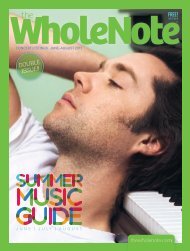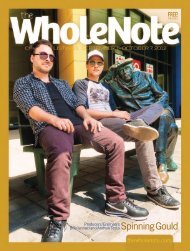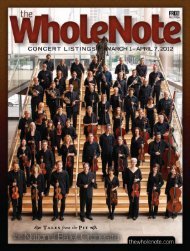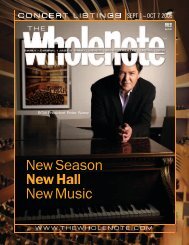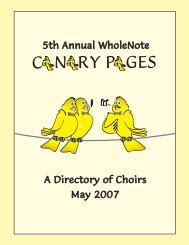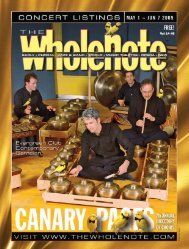Create successful ePaper yourself
Turn your PDF publications into a flip-book with our unique Google optimized e-Paper software.
DISCOVERIES | RECORDINgS REVIEWED<br />
The National Youth Orchestra of Canada<br />
has released a 2-CD set documenting<br />
its 2012 adventure under the baton of<br />
Alain Trudel. Russian Masters – Canadian<br />
Creations (nyoc.ca) includes sterling performances<br />
of selections from Prokofiev’s Romeo<br />
and Juliet, Tchaikovsky’s 1812 Overture<br />
and Shostakovich’s Symphony No.10 in E<br />
Minor alongside new works from young(ish)<br />
Canadian composers Nicolas Gilbert and<br />
Adam Sherkin. If the playing on this disc is<br />
any indication, the future of orchestral music<br />
in this country is in good hands. The playing<br />
is dynamic and nuanced with strong attention<br />
to detail and line. Trudel is to be commended<br />
for his work bringing these young musicians<br />
from across the country into a cohesive and<br />
convincing whole. My only complaint is with<br />
the lack of musicological information. There<br />
is a booklet with extensive details about the<br />
organization — mission statement, audition<br />
process, training and touring programs — and<br />
a biography of Trudel, a complete list of the<br />
musicians and even the recording personnel,<br />
but not a word about the composers or the<br />
music. Perhaps the “Russian Masters” need<br />
no introduction, but this is a real disservice<br />
to the Canadians. I assumed that they were<br />
commissioned to write these works specifically<br />
for the NYOC and a visit to the website<br />
confirms this was the case for Gilbert’s<br />
Résistance but that is the only information<br />
I can find there. Sherkin’s Terra Incognita<br />
remains “unknown” with no mention of its<br />
origin or context. (A Google search turned up<br />
the information that this work was developed<br />
at an orchestral workshop of the Buffalo<br />
Philharmonic and a revised <strong>version</strong> was performed<br />
in 2005 at the Royal Conservatory in<br />
Toronto under Trudel’s direction.) Both works<br />
make full use of the orchestra’s resources<br />
skilfully although neither breaks any particularly<br />
new ground.<br />
Montreal’s Nicolas Gilbert’s chamber<br />
music has been heard in Toronto in several<br />
contexts, performed by the Ensemble<br />
contemporain de Montréal, New Music<br />
Concerts and Continuum, and in recent<br />
years he has served as host on the ECM’s<br />
cross-country “Generation” tours. Sherkin<br />
is a Toronto-based composer and pianist<br />
with a burgeoning international career<br />
whose new Centrediscs release of solo piano<br />
compositions is reviewed by Nic Gotham further<br />
on in these pages. It is great to have the<br />
opportunity to hear large scale orchestral<br />
compositions by these two; I only wish we<br />
were given some background information.<br />
There is no shortage of information on the<br />
CD Sharp Edges featuring music of Toronto<br />
composer Robert A. Baker (robertabaker.net)<br />
who completed his doctorate at McGill<br />
DAVID OLDS<br />
University in 2009 and now makes his home<br />
in Maryland. The notes start with an Artistic<br />
Statement which states in part “At the heart<br />
of my musical imagination is a fundamental<br />
contradiction. On the one hand I<br />
want to hear music of the distant<br />
past, maintain a sense of connection<br />
to my musical heritage, and<br />
in this way feel a part of humankind.<br />
On the other hand, I feel<br />
an irresistible curiosity; a need<br />
to consider sound in as objective<br />
a manner possible, embrace<br />
any sonic option that is relevant<br />
and practical, no matter how<br />
unconventional, and attempt to<br />
hear what I have not yet heard,<br />
and say what I have not yet said.”<br />
In addition to his activities as<br />
a composer, pianist, conductor<br />
and teacher, Baker is an active<br />
researcher on contemporary music<br />
analysis and philosophies on the<br />
perception of musical time. These<br />
concerns are exemplified in the<br />
seven compositions showcased on<br />
this excellent recording. A series of<br />
four works titled Valence, ranging<br />
from solo piano to an ensemble of<br />
six instruments, are interspersed<br />
with independent pieces including<br />
the title track for four strings<br />
and percussion, another piano<br />
solo and a string quartet. This<br />
last which “evokes an array of<br />
references ranging from the distant<br />
to the recent past in Western<br />
musical history” was premiered at<br />
the Canadian Contemporary Music<br />
Workshop in Toronto in 2004. This<br />
recording of the two part ethereal<br />
then angular piece features Toronto’s Elgin<br />
Quartet. The Valence series was composed<br />
between 2008 and 2011 and is presented<br />
here in reverse chronology. The disc begins<br />
with the final instalment, scored for clarinet,<br />
trumpet, piano, percussion, violin and<br />
cello, and ends with the solo piano precursor.<br />
It is intriguing to hear how the treatment<br />
of the material changes from incarnation to<br />
incarnation. Sharp Edges is not only the title<br />
of a 2009 composition for violin, viola, cello,<br />
double bass and percussion, but also an apt<br />
description of Baker’s uncompromising music<br />
which encompasses the past while embracing<br />
the future.<br />
In March 2012 the Toronto Symphony<br />
Orchestra’s New Creations Festival was curated<br />
by Hungarian conductor and composer<br />
Peter Eötvös. During the week Toronto audiences<br />
had the opportunity to hear a number<br />
of his works thanks to both the TSO and New<br />
Music Concerts. One of the highlights was<br />
the Canadian premiere of the Eötvös’ violin<br />
concerto Seven, a memorial to the astronauts<br />
of the Space Shuttle Columbia. The<br />
number seven provides the shape of not only<br />
the musical materials of the piece, but also<br />
the layout of the orchestra into seven mixed<br />
instrumental groups and the placement of the<br />
six tutti violins (seven violins counting the<br />
soloist) throughout the hall, distant from the<br />
stage, “in space” as it were.<br />
A new recording of this stunning work<br />
appears on Bartók/Eötvös/<br />
Ligeti featuring violinist Patricia<br />
Kopatchinskaja, the Frankfurt<br />
Radio Symphony Orchestra and<br />
Ensemble Modern under Eötvös’<br />
direction (Naïve V 2585). The 2-CD<br />
set also includes Bartók’s Violin<br />
Concerto No.2 dating from 1939<br />
and the five-movement <strong>version</strong> of<br />
Ligeti’s Violin Concerto from 1992,<br />
the premiere of which was conducted<br />
by Peter Eötvös in Cologne.<br />
Spanning roughly 70 years, this<br />
recording effectively brings<br />
together works by the most<br />
important Hungarian composers<br />
of the 20th century in<br />
sparkling performances by the young<br />
Moldovan violinist.<br />
The Bartók concerto has of<br />
course become a classic of the<br />
repertoire and this recording<br />
reminds us why. The Ligeti,<br />
scored for a chamber orchestra<br />
of 23 players including natural<br />
horns and four winds doubling<br />
on ocarinas, is an extremely challenging<br />
work first heard in Toronto<br />
with Fujiko Imajishi as the soloist<br />
with New Music Concerts in<br />
1999. (She later reprised the<br />
work with Esprit Orchestra.)<br />
Described in the notes as “a<br />
characteristic example of<br />
Ligeti’s late work ... Elements<br />
of music from the Middle Ages to the<br />
Baroque, Bulgarian and Hungarian folksong,<br />
polyrhythmic superimpositions as in<br />
the piano rolls of Conlon Nancarrow and an<br />
exorbitantly difficult solo part are forcibly<br />
yoked into complex constructs that liberate<br />
undreamt-of sonic energies and make listening<br />
into an adventure.” It is all that and more.<br />
My final selection for the month also has<br />
a (perhaps tenuous) Toronto connection.<br />
Chinese born American composer Tan Dun<br />
was selected by Glenn Gould Prize laureate<br />
Toru Takemitsu for the City of Toronto Protégé<br />
Prize in 1996. A recent Naxos release, Tan<br />
Dun – Concerto for Orchestra (8.570608)<br />
includes two compositions from 2012,<br />
the title work and the Symphonic Poem<br />
on Three Notes, juxtaposed with 1990’s<br />
Orchestral Theatre performed by the Hong<br />
Kong Philharmonic Orchestra under the<br />
composer’s direction. This disc provides a<br />
welcome entrée into the concert music of the<br />
composer who came to international atten-<br />
February 1 – March 7, 2013 thewholenote.com 53



